
-
Finde das richtige Futter für dein TierFülle den Fragebogen aus und finde das passende Futter für deine vierbeinigen LieblingFinde das richtige Futter für dein TierFülle den Fragebogen aus und finde das passende Futter für deine vierbeinigen LieblingZugehörige Produkte
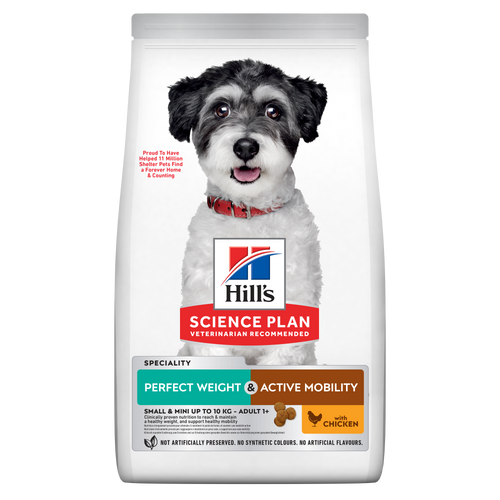 Perfect Weight + Active Mobility Hundefutter
Perfect Weight + Active Mobility HundefutterKlinisch erprobte Ernährung zum Erreichen und zur Erhaltung eines gesundes Gewichts sowie zur Unterstützung einer gesunden Beweglichkeit
Shop Now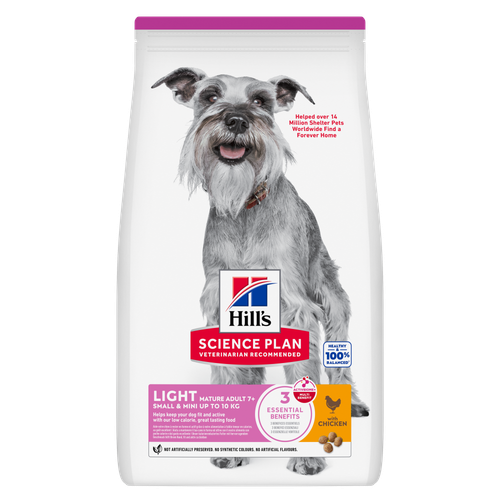 Light Small & Mini Mature Adult Hundefutter
Light Small & Mini Mature Adult HundefutterHill’s Science Plan Light Mature Adult Small & Mini Hundefutter mit Huhn ist ein Alleinfuttermittel, das speziell mit der ActivBiome+ Multi-Benefit-Technologie formuliert wurde.
Mit unserem kalorienarmen, wohlschmeckenden Futter bleibt dein Hund fit und aktiv.
Eine präzise Ernährung für weniger aktive ältere Hunde kleiner Rassen, die ein kalorienarmes Futter benötigen, das hilft, ein gesundes Gewicht zu halten.Shop Now Hypoallergenic Small & Mini Hundefutter
Hypoallergenic Small & Mini HundefutterHILL'S SCIENCE PLAN Hypoallergenic Small & Mini Adult Hundefutter mit Lachs ist ein Alleinfuttermittel für erwachsene Hunde kleiner Rassen im Alter von 1-6 Jahren. Es wurde entwickelt für Hunde mit empfindlicher Haut und empfindlichem Magen, mit einer begrenzten Anzahl an hochwertigen, neuartigen Proteinquellen und ohne Getreide.
Shop NowHäufige DiagnosenZugehörige Produkte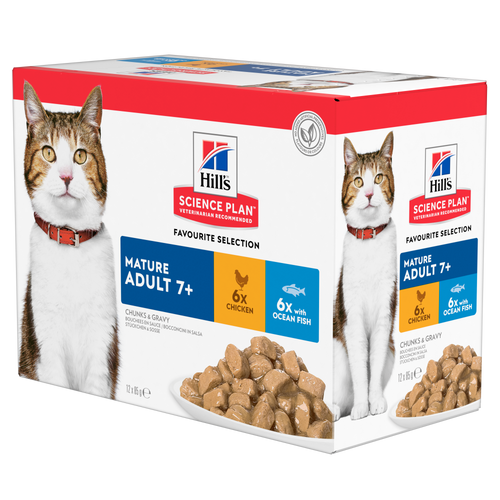 Mature Adult 7+ Multipack Nassfutter für Katzen
Mature Adult 7+ Multipack Nassfutter für KatzenZarte Stückchen in Soße für ältere Katzen. Hergestellt mit leicht verdaulichen Zutaten, hochwertigem Protein zur Erhaltung schlanker Muskeln sowie antioxidativem Vitamin C + E für optimale Gesundheit.
Shop Now Light Adult Katzenfutter mit Huhn
Light Adult Katzenfutter mit HuhnZarte Stückchen Huhn in Soße für Katzen, mit L-Carnitin und weniger Kalorien für ein optimales Gewichtsmanagement. Voll an hochwertigem Protein, Omega-6-Fettsäuren und Vitamin E für glänzendes Fell und gesunde Haut.
Shop Now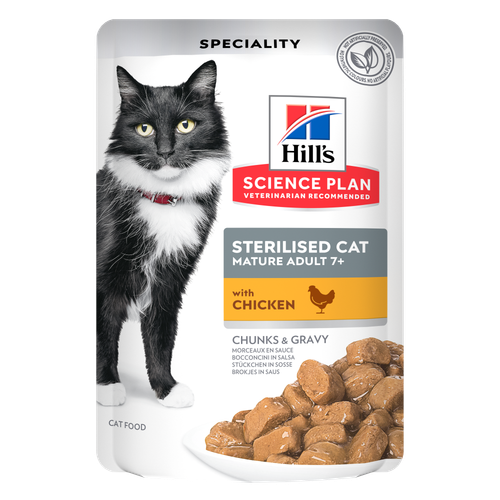 Sterilised Cat Mature Adult 7+ Nassfutter
Sterilised Cat Mature Adult 7+ NassfutterHill's Science Plan Sterilised Cat Mature Adult Nassfutter für Katzen mit Huhn ist ein Alleinfuttermittel für kastrierte Katzen ab einem Alter von 7 Jahren.
Shop Now -
Hund
- Tipps & Artikel zum Hund
-
Häufige Diagnosen Katze
- Gewicht
- Haut & Futtemittelempfindlichkeiten
- Harnwege
- Verdauung
- Gelenke
- Niere
- Genesung
- Zahnpflege
-
Lebensphasen - Hunde
- Ernährung von Welpen
- Ernährung von erwachsenen Hunden
- Ernährung von älteren Hunden
Katze- Tipps & Artikel zur Katze
-
Häufige Diagnosen Katze
- Gewicht
- Haut & Futtemittelempfindlichkeiten
- Harnwege
- Verdauung
- Niere
- Genesung
- Zahnpflege
- Stress
-
Lebensphasen - Katzen
- Ernährung von Kätzchen
- Ernährung von erwachsenen Katzen
- Ernährung von älteren Katzen
zugehörige Artikel Was Du über die Kalorien von Tierfutter wissen solltest
Was Du über die Kalorien von Tierfutter wissen solltestLerne festzustellen, wie viele Kalorien Dein Hund oder Deine Katze jeden Tag braucht, wie Du ihre Kalorien zählen kannst und was zu tun ist, wenn sie zu viele aufnehmen.
Read More Ein Leitfaden für Haustierbesitzer:innen für sichere Wasserquellen für Haustiere
Ein Leitfaden für Haustierbesitzer:innen für sichere Wasserquellen für HaustiereStelle die Flüssigkeitszufuhr Deines Haustiers sicher, mit unserem Leitfaden für Haustierbesitzer:innen für sichere Wasserquellen für Haustiere. Für weitere Tipps zur Aufrechterhaltung der Gesundheit Deines Haustiers besuche Hill’s.
Read More Dürfen Hunde und Katzen Butter fressen?
Dürfen Hunde und Katzen Butter fressen?Erfahre alles darüber, ob Butter für Deinen Hund oder Deine Katze unbedenklich ist und was zu tun ist, wenn Dein Vierbeiner sie frisst.
Read More -

 Wissenschaftlich basierte Ernährung macht den Unterschied, dem du vertrauen kannst
Wissenschaftlich basierte Ernährung macht den Unterschied, dem du vertrauen kannst


Growing dogs need plenty of food and your veterinarian may tell you to feed a new puppy a few times a day. However, what about when your dog gets older? You might wonder, "how often should I feed my dog?" or "how much should my dog eat?"
To answer those questions, here are some feeding guidelines that cover playful puppies, relaxed seniors, and every age in between.
Nourishing a Puppy
Since puppies grow quickly and burn so much energy, they need to eat highly nutritious food and they need it often. You'll start out feeding your puppy frequently, then slowly wean them down to fewer feedings. This process will help them grow big and strong.
6 to 12 Weeks
Puppies should be eating food nutritionally designed to meet the bone development, muscle growth and energy needs for an on-the-move puppy. A quality puppy food contains optimal amounts of protein, DHA, and vitamins to keep your puppy growing at appropriate rates. The Kennel Club UK recommends four feedings a day for puppies during this time period. It's also a good idea to start puppies with moistened food to help them chew.
3 to 6 Months
The Kennel Club recommends decreasing feedings to three a day when your puppy reaches four months old. During this phase, feed them puppy-sized portions until you see their baby potbelly and pudginess starting to disappear – signs that their body is starting to mature.
6 to 12 Months
At six months, the Kennel Club recommends reducing to twice-daily feedings. Keep in mind that after your dog is neutered, their energy level may decrease, so you need to make sure that you are feeding them the correct amount. It’s also a good time to start thinking about what food you want to offer when you switch from nutrient-rich puppy food to adult food. While you should always check with your vet about your puppy's individual needs, small and medium breeds typically transition to adult food at 12 months, while large or giant breeds may not transition until 18 months of age.
It's also good to make the switch to adult food over a 5-7 day period. Too abrupt of a change may cause stomach problems for your pooch. To transition between foods, mix your dog's current food with a small amount of their new food. Over the course of a week, gradually decrease the amount of the current dog food while increasing the amount of new dog food for a safe and comfortable transition.
As with anything that plays a pivotal role in your dog's overall health and development, talk to your veterinarian about proper feeding regimes. While dog food bags and cans will often provide feeding instructions on the packaging, calorie needs can vary from dog to dog based on breed, weight, activity level and more. Your vet will be able to provide you with the best recommendation for feeding your pup for healthy growth.


Leckere Tipps
Welpen benötigen im ersten Jahr möglicherweise mehrere Impftermine. Erwachsene Hunde profitieren in der Regel von jährlichen Kontrolluntersuchungen, während ältere Hunde oder Hunde mit besonderen Bedürfnissen häufigere Besuche benötigen.
Feeding an Adult Dog
Once your dog is fully grown, you need to make sure you're feeding them dog food that keeps them healthy and fit, so that they avoid developing health issues. Their food type and portion size should be tailored to their breed, size, and lifestyle. Again, this is a good conversation to have with your veterinarian to ensure they receive adequate nutrition.
Years 1 to 7
Most owners feed adult dogs two half-portions a day. How much is that? It depends on your dog. Measure food, rather than eye-balling it, to make sure your dog is getting the right amount each day. Keep an eye on your dog for signs of weight gain, and cut down on food if necessary under the supervision of your vet. Some of the signs your dog is overweight include not being able to feel their ribs, loss of a discernible waist, pads of fat over the hips and base of the tail and a waddling gait.
Dogs should eat at regular times, usually once in the morning and once in the evening — the key is consistency. Also, keep in mind that the type of food you choose is important. If you have a more sedentary dog, consider a food that matches their lifestyle to ensure they still get the right nutrients without causing them to gain weight.
Years 7+
Your dog is getting older and perhaps a little slower. Remember that dogs age more quickly than people do, so major health changes occur much earlier in life. Choose a food specially formulated with ingredients that support brain, immune and digestive function, energy levels, and a luxurious coat. Food formulated for ageing pets also takes into consideration that their metabolism will have likely slowed down. Choosing the right food will help give your older pup the right amount of calories, while including additional nutrients to help them get their youthful spirit back.
Caring for a Senior
Your dog has officially made it over the hill of middle age. With seniority your dog is changing, so make sure you're keeping an eye on their nutrition and health, and consult your vet to see if you should switch to a senior dog food.
 Larger breeds may reach seniority sooner than smaller breeds, so it is important to ask your vet when your pooch has reached their golden years. For instance, your Jack Russell terrier might still be barreling around the house at eleven, but your golden retriever might be slowing down by age seven.
Larger breeds may reach seniority sooner than smaller breeds, so it is important to ask your vet when your pooch has reached their golden years. For instance, your Jack Russell terrier might still be barreling around the house at eleven, but your golden retriever might be slowing down by age seven.
It might be around this time that you'll want to cut back on food to avoid the weight gain that comes with less activity. You should also watch senior dogs for signs of weight loss, which can be a sign of health issues, like dental problems. Continue with twice-daily feedings as your dog may appreciate the routine. If you see changes in your dog's weight or eating habits, talk to your vet.
Feeding your dog the right amount of high-quality dog food through each step of their life will go a long way towards keeping your four-legged friend healthy. Just as eating amounts vary from person to person, eating amounts vary from dog to dog, which is why consulting your vet is the best place to start.
Keep in mind the above age ranges and information are just guidelines. Health issues might age your dog faster, or they could remain vital well into their senior years. Monitoring your dog's health, choosing high-quality dog food for every life stage, and keeping an open dialogue with your vet will help you answer how much to feed your dog and make the best choices to nourish your furry friend through puppyhood and into their golden years.


Einer unserer Autoren hat diesen Artikel für Sie verfasst
Produkte für Katzen mit Nierenproblemen

HILL'S SCIENCE PLAN Hypoallergenic Small & Mini Adult Hundefutter mit Lachs ist ein Alleinfuttermittel für erwachsene Hunde kleiner Rassen im Alter von 1-6 Jahren. Es wurde entwickelt für Hunde mit empfindlicher Haut und empfindlichem Magen, mit einer begrenzten Anzahl an hochwertigen, neuartigen Proteinquellen und ohne Getreide.

Klinisch erprobte Ernährung zum Erreichen und zur Erhaltung eines gesundes Gewichts sowie zur Unterstützung einer gesunden Beweglichkeit
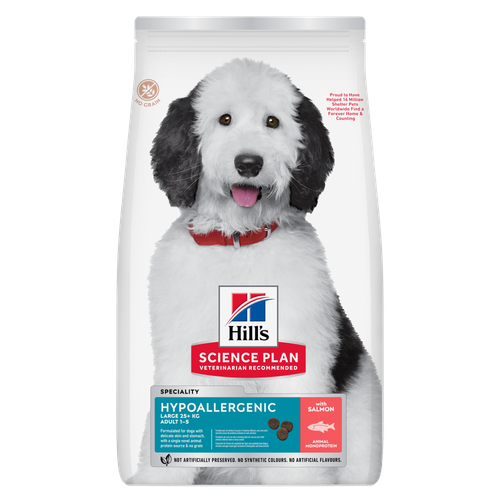
HILL'S SCIENCE PLAN Hypoallergenic Large Breed Adult Hundefutter mit Lachs ist ein Alleinfuttermittel für erwachsene Hunde großer Rassen im Alter von 1-5 Jahren. Es wurde entwickelt für Hunde mit empfindlicher Haut und empfindlichem Magen, mit einer begrenzten Anzahl an hochwertigen, neuartigen Proteinquellen und ohne Getreide.

Hill’s Science Plan Light Mature Adult Small & Mini Hundefutter mit Huhn ist ein Alleinfuttermittel, das speziell mit der ActivBiome+ Multi-Benefit-Technologie formuliert wurde.
Mit unserem kalorienarmen, wohlschmeckenden Futter bleibt dein Hund fit und aktiv.
Eine präzise Ernährung für weniger aktive ältere Hunde kleiner Rassen, die ein kalorienarmes Futter benötigen, das hilft, ein gesundes Gewicht zu halten.
Weiterführende Artikel

Erfahre, wie Du erkennst, ob Dein Hund Magenprobleme oder einen empfindlichen Magen hat, wie ein Tierarzt bzw. eine Tierärztin diese behandeln kann und wie die Ernährung helfen kann.

Erfahre die Vorteile von Nassfutter für Hunde und wie es die Gesundheit und das Wohlbefinden Deines Haustiers verbessern kann. Weitere Informationen zu Ernährung findest Du bei Hill’s.

Verstehe die Ernährungsbedürfnisse Deines kleinen älteren Hundes für ein längeres, gesünderes Leben. Finde die richtige Ernährung mit fachkundiger Beratung von Hill’s.

Finde heraus, was die beste Ernährung für kleine Hunderassen ist und was das perfekte Futter für ihre Gesundheit ist. Weitere Tipps für kleine Hunde findest Du bei Hill's.

Setze deinen Hund auf Diät, ohne dass er es merkt
Unsere kalorienarme Formel hilft, das Gewicht deines Hundes zu kontrollieren. Sie enthält hochwertiges Protein für den Muskelaufbau und ist mit gezielt ausgewählten Zutaten für eine schmackhafte, nahrhafte Mahlzeit zubereitet. Klinisch erprobte Antioxidantien sowie Vitamin C und E fördern ein gesundes Immunsystem.
Setze deinen Hund auf Diät, ohne dass er es merkt
Unsere kalorienarme Formel hilft, das Gewicht deines Hundes zu kontrollieren. Sie enthält hochwertiges Protein für den Muskelaufbau und ist mit gezielt ausgewählten Zutaten für eine schmackhafte, nahrhafte Mahlzeit zubereitet. Klinisch erprobte Antioxidantien sowie Vitamin C und E fördern ein gesundes Immunsystem.